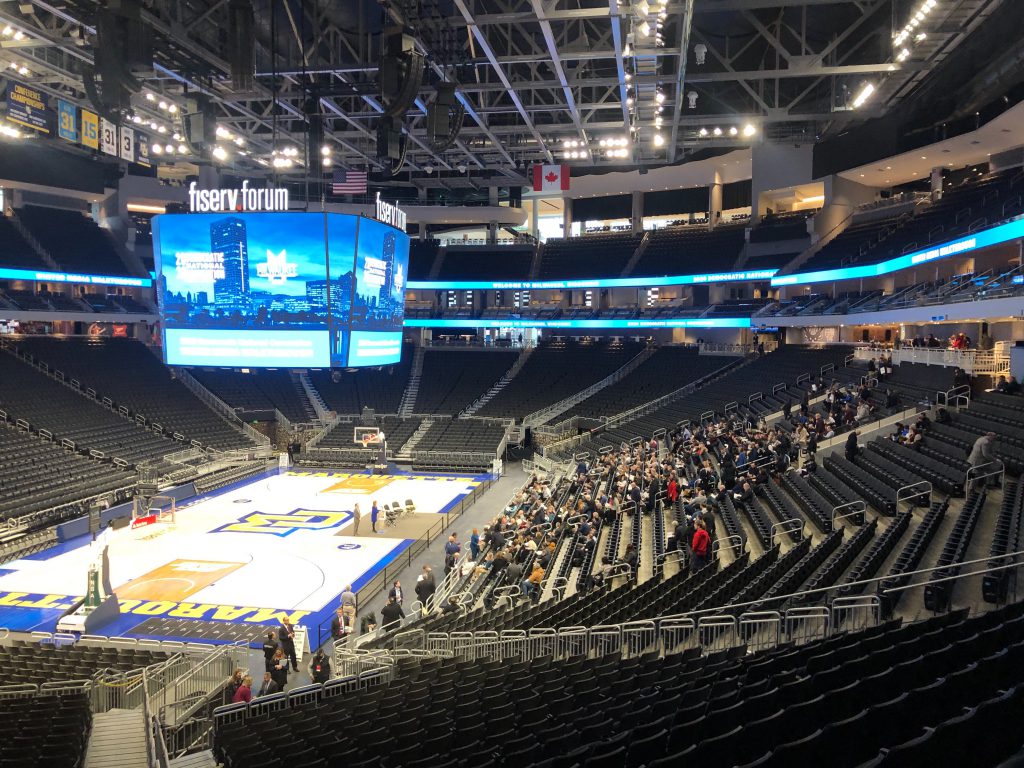How Will State Party Pick DNC Delegates?
Complicated formula to assure geographic, gender, racial balance for 84 delegates.
Wisconsin Democrats will send 84 delegates to the party’s Milwaukee national convention, not counting the 13 “superdelegates” who as party officials cannot vote on the first ballot for the nominee for President.
To send “the most diverse delegation possible” to the July 13-16 Milwaukee convention, state party officials have set these goals for “traditionally underrepresented groups” who will be among the 84 pledged delegates: African-Americans, 11; Hispanics, 6; Native Americans, 2; Asian/Pacific Islanders, 4; LGBTQ+ Americans, 8; delegates with disabilities, 13; youth (under 30), 29, and Muslim Americans, 2.
“The party will make efforts to reach out to leaders in these communities,” party officials say, explaining how Wisconsin Democrats can apply to be delegates to the first national convention in their home state. Democrats interested in becoming one of the 84 convention delegates must submit a “statement of intent” that asks if they belong to any of the “underrepresented” groups.
Wisconsin delegates will also be chosen by how many votes the party’s 2016 presidential candidate, Hillary Clinton, and the Democratic candidate for governor, Gov. Tony Evers, in 2018 got in their county and Congressional district.
State Sen. Janet Bewley, a “superdelegates” because she is a member of the Democratic National Committee (DNC), defended the party’s setting of specific racial, gender and ethnic goals for the 84 delegates. “It’s a result of people wanting to be able to measure success,” Bewley said.
Bewley said she looks forward to the day when the Democratic Party’s decision-making conventions are so diverse the party won’t have to set specific racial, gender and ethnic goals Until that day, Bewley added, “How can you be accountable if you don’t count?
Bewley is fine with the change made after the 2016 Democratic National Convention that prevents superdelegates like her from voting on the first convention ballot for the party’s presidential nominee.
Bewley won’t say who – former Vice President Joe Biden or Vermont Sen. Bernie Sanders – she supports as the party’s nominee for President. As a DNC member, “I have another role to play,” she said.
Courtney Beyer, communications director for the Wisconsin Democratic Party, said no delegate is bound by party rules to support a specific candidate for President. If the Milwaukee convention turns into a Biden-versus-Sanders showdown, Beyer said, “Presidential campaigns will run their own political whip operations to try to keep their delegates voting with them or to sway others.”
Exactly how will Wisconsin’s convention delegates be chosen?
*55 District-Level Delegates: Candidates for these 55 slots must file intent forms with the state party by April 17, be considered at county caucuses April 26 and elected at Congressional district caucuses May 17.
The Madison-area’s 2nd Congressional District will elect 11 – six men and five women – district delegates; Milwaukee’s 4th District will elect 9 – five women and four men.
Five of the other Congressional districts will each elect six delegates. Bewley’s 7th District, which makes up much of northwest and north-central Wisconsin, will elect five. District-level numbers are based on past regional vote totals for President and governor.
*19 At-Large Delegates: The 19 will be chosen by the state Democratic Party’s Administrative Committee on June 12, before the party’s annual convention in Wisconsin Dells. Their statements of intent must be filed by May 29.
*10 Pledged Party Leaders and Elected Officials (PLEOs): These 10 will also be chosen by the party’s Administrative Committee before the June 12 convention. These 10 slots are for Democratic legislators “and other state, county and local elected officials and party leaders.” They must also file intent forms by May 29. Lt. Gov. Mandela Barnes, for example, must apply to be a PLEO.
*13 Automatic Delegates, or “superdelegates:” Gov. Evers, U.S. Sen. Tammy Baldwin; Party Chairman Ben Wikler; Felesia Martin, Party 1st Vice Chair; Jason Rae, DNC secretary; DNC members Khary Penebaker, Andrew Werthmann, Bewley, Martha Love and Mahlon Mitchell; and U.S. Reps. Mark Pocan, Gwen Moore and Ron Kind.
Steven Walters is a senior producer for the nonprofit public affairs channel WisconsinEye. Contact him at stevenscotwalters@gmail.com
More about the DNC
- Milwaukee Again Bidding To Host DNC - Jeramey Jannene - Sep 28th, 2021
- Milwaukee Invited To Apply For 2024 DNC - Jeramey Jannene - Aug 3rd, 2021
- City Hall: How Much Did DNC Cost Milwaukee? - Jeramey Jannene - Sep 16th, 2020
- Get Your DNC Memorabilia - Jeramey Jannene - Aug 25th, 2020
- Murphy’s Law: Will Biden’s DNC Snub Hurt Him In State? - Bruce Murphy - Aug 24th, 2020
- Activist Coalition Holds Largest March of DNC - Ethan Duran - Aug 21st, 2020
- DNC: Last Night Brings Little Exposure for Milwaukee - Jeramey Jannene - Aug 20th, 2020
- With DNC as Backdrop, A Discussion of Black Liberation - Ethan Duran - Aug 20th, 2020
- Suburban Protesters March From Tosa to DNC - Ethan Duran - Aug 20th, 2020
- DNC: With A “Holy Mackerel” Tony Evers Kicks Off DNC - Jeramey Jannene - Aug 19th, 2020
Read more about DNC here
The State of Politics
-
A Wisconsin Political Trivia Quiz
 Dec 15th, 2025 by Steven Walters
Dec 15th, 2025 by Steven Walters
-
The Fight Over Wisconsin’s House Districts
 Dec 8th, 2025 by Steven Walters
Dec 8th, 2025 by Steven Walters
-
The Battle Over On-Line Betting
 Nov 24th, 2025 by Steven Walters
Nov 24th, 2025 by Steven Walters





















